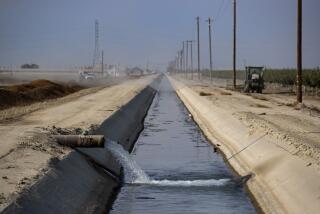Rate Hike, Sale of Excess Urged to Save West’s Water
- Share via
WASHINGTON — The World Resources Institute, saying that the water crisis in Western states results not from an overall shortage but from poor management, on Thursday called for raising urban water rates and allowing farmers to sell water they do not use.
The institute, in a report designed to make more efficient use of water economically attractive, also urged the trading and leasing of water within and among states. The report discouraged the idea of new water projects. It said that the cost of obtaining new supplies is rising and that conservation and reallocation could meet demand more efficiently.
“The traditional strategy of increasing water supplies through capital-intensive projects has reached its limits,” said Mohamed T. El-Ashry, an expert on water projects and a co-author of the report. “Efficient use, increased mobility and least-cost accounting . . . should become the future cornerstones of future water resource management in the West.”
New Projects Downplayed
Rep. George Miller (D-Martinez), chairman of the House Interior and Insular Affairs subcommittee on water, praised the report. The institute is a policy research center headed by Gus Speth, who was chairman of the Council on Environmental Quality in the Jimmy Carter Administration. Miller said that continued reliance on new projects is “environmentally unacceptable, economically not working and unsuited for today’s marketplace.”
The report recommends that Western cities, which have the highest per-capita municipal water usage in the country, seek to reduce consumption by raising rates. The Metropolitan Water District of Southern California, which supplies large sections of the Los Angeles metropolitan area, could reduce demand by 260,000 acre-feet annually by the end of the century if it raised prices 13.1% now, according to one estimate in the report.
Allowing farmers to resell unneeded water would offer incentive to improve the efficiency of agricultural use, the report said. Because the federal government heavily subsidizes irrigation, the report added, farmers can have it inexpensively and have little reason to conserve water.
Incentive to Conserve
“If they can sell the extra water, they will use it more wisely and conservatively,” said Diana Gibbons, an independent consultant who is the other co-author of the report.
California law already allows for resale of conserved water. Agriculture accounts for 92% of all water used in the state, and the Central Valley Project alone is nearly 90% subsidized.
In recommending that interstate water markets be encouraged, the report said that arrangements such as the Colorado River Compact, under which water is shared between the Upper Basin states--Utah and Colorado--and the Lower Basin area, which includes Southern California, promote inefficient use in the upriver areas.
“So long as an Upper Basin state cannot benefit from unused releases to the Lower Basin and fears the loss of water rights in the future, it will continue to support uneconomic water development projects and inefficient water use within its borders,” the report said.
More to Read
Sign up for Essential California
The most important California stories and recommendations in your inbox every morning.
You may occasionally receive promotional content from the Los Angeles Times.













